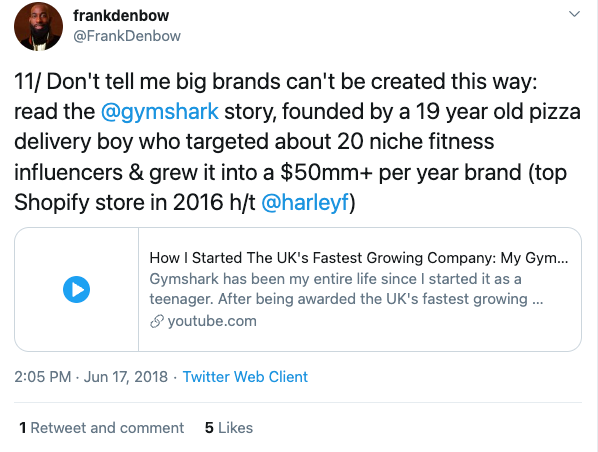Buying Your Way To The Top

The shortcut of using money to skip the hard stuff has been a strategy used for centuries. It manifests often in venture capitalists and private equity folks spending insane amounts of money to buy up smaller companies in order to roll them up into a bigger entity, finding accounting tricks and manipulations to flip the new entity to a bigger sucker.
This isn't entrepreneurship. It takes no creativity to buy a bunch of companies but it often is conflated with entrepreneurship. The pitch is always that with all these smaller companies together under one roof, the infinite wisdom of the MBA acquirers will bring supply chain optimization and big profits.
Stop listening to this man
Its the pitch Kevin O'Leary told to Mattell after The Learning Company (which acquired a bunch of education startups in the industry) sold to them for $3.6 billion in 1999. They told a bunch of lies to get the deal done, and Mattell and O'Leary had to settle for $100m+ to the shareholders for all the accounting tricks that took them from a projected $50m profit to a $100m loss right after the deal closed. $3B in shareholder value was wiped out in a single day. How this man has the gall to be on television giving anyone advice on building a company after The Learning Company, FTX, clowning Black women for their startup that went on to get into 5000+ CVS / Target stores, and his funds is beyond me. I think theres a phrase for that kind of confidence.
Investors who have no cultural understanding laugh you out the room...
In our fast paced world, these stories get buried under a new layer of content. We rarely get long form analysis of the tropes and strategies over a long haul to see if they are actually sustainable. Do they provide long term results? Are these ideas worth replicating? We tend to see someone raise a bunch of money and then 50 entrepreneurs say to themselves, well thats what I need to do to get the money so I'm going to do that. Rarely is there analysis that brings us down to earth to say, we were wrong here and this is why.
... then you get into 5k stores because they are completely off base
This startup pimping is happening again, this time in eCommerce. Lets just start with two headlines, 2 years apart:
October 2021: "Thrasio, the Amazon aggregator, raises $1B in fresh funding at a valuation of up to $10 billion"
December 2023: "Thrasio files for Bankruptcy"
Lets take a quote from the first article:
"The company, founded in 2018, has now raised $3.4 billion, including a $650 million debt round earlier this year.
Thrasio is one of the pioneers of the modern “roll up” player, and its traction, along with the wider opportunity in the market, has spawned dozens of other startups around the world building businesses replicating its model that have collectively raised hundreds of millions of dollars in equity and debt to build out their businesses. Other recent fundings in the space have included Heroes, which raised $200 million in August; Olsam ($165 million); Suma Brands ($150 million); Elevate Brands ($250 million); Perch ($775 million); factory14 ($200 million); as well as Heyday, The Razor Group, Branded, SellerX, Berlin Brands Group (X2), Benitago, Latin America’s Valoreo and Rainforest and Una Brands out of Asia."
Founder 1 Month Ago "We are going to see a nice steady market upwards over the coming years"
Somehow this article failed to mention OpenStore by Silicon Valley (now Miami's) favorite curmudgeon Keith Rabois, famous for his creative accounting and ability to lose massive amounts of money. If you're not familiar with him, here is a crash course in his Trumpian tactics of insult and deflect.
Things got contentious today on @CNBCTechCheck – here's the full conversation with @Opendoor Co-Founder @rabois and our @dee_bosa and @jonfortt. pic.twitter.com/CBos2TiKYj
— TechCheck (@CNBCTechCheck) September 23, 2022
It’s jarring that an idea this bad could get 10 billion dollars but here we are. Thrasio raised 3.5 billion to buy up amazon stores and is already bankrupt 2 years later. This is entirely predictable because Amazon is a horrendous place to sell on. You have no customer connection, no control over the traffic, you’re at the whim of amazon who likes to crack the whip if they don’t like what you’re doing. There are tons of horrible companies that try to steal your products and claim it as theirs, or bomb you with negative reviews. Heck Amazon will copy your business themselves and undercut you with no remorse with all of their white label brands. It’s a cutthroat place. Every last one of these aggregator companies is going out of business. Openstore too, although they will last a bit longer because these are Shopify stores with more independent audiences and some will last (also Jack Abraham is a genius). From the looks of it though, if they are buying up tiny high touch Shopify stores, its going to be a rough road.
Fundamentally, you are taking authentic brands and stripping them of their authenticity, and running the standard BIG VC ROLL UP strategy to craft brands. It will not work. All of these companies are going to 0. All of them.
Ever since Everlane (started by my college TA and whose employee #1 I referred ), people care about a brand story that is legit all the way through. There’s enough information and tools out there that influencers and folks who are already bringing the audience don’t need Keith Yaboi to tell them how to grow their brand, they can do it on their own and retain the asset. I have been writing about this part to the industry for a decade, how craft brands are going to explode, especially as the creator economy continues to grow. The supply chain is operationalized perfectly now for creators who no longer need to pay upfront for inventory or go back and forth with vendors to create any product that makes sense to their audience.

Amazon is a dead platform for me (as a seller). TikTok’s new TikTok shop is an interesting wrinkle and will be where Amazon loses as they are the ones to figure out this social commerce thing in a way that makes sense. Meta had a chance to build this into Instagram but fell asleep at the wheel (they don’t even have a public commerce api for startups to integrate. Seriously?). As my gen z friend said to me, we look at Instagram how you look at Facebook now. Which is to say, Instagram is filled with ads and spam. (Sidenote: with how Meta has stuffed more features in to WhatsApp now also, it will be funny to see how Snapchat and TikTok end up being the winners in 10 years).
Still, I think independent medium size brands are going to win even over the TikTok’s and Sheins of the world. There is a race to the bottom in terms of price that leads to human rights abuses that will be revealed in due time. If you’re buying a t-shirt for $2 and shoes for $4, somebody is getting screwed somewhere in the world, people just turn a blind eye until that information is revealed eventually. My hope is that people at some point get hip to these facts and change their consumer behavior but who am I kidding: people are selfish.

Advertisers are eventually going to realize their dollars are better spent building up organic audiences themselves or funding creators in their industry than playing the Turkish Ice Cream game that Meta plays with the reach on all their properties.

It frustrates me that 10s of billions of dollars are lit on fire while Black founders received 0.13% of capital this Q3. These same people raising billions for really bad ideas are lobbying to stop funding black venture firms and telling black workers to just shut up and code. This is why I beat the drum that we have to build communities of entrepreneurs that are bootstrapping and lift each other up by sharing knowledge, real feedback and customer networks. The money is not coming.
In this market, what matters is authentic brands, with influencers who have been a part of the community building aspect of a brand for a demonstrable amount of time. That’s what people want to support, and the opportunity is to find those emerging influencers, give them the design/fulfillment/marketing infrastructure so that they can continue being themselves.
